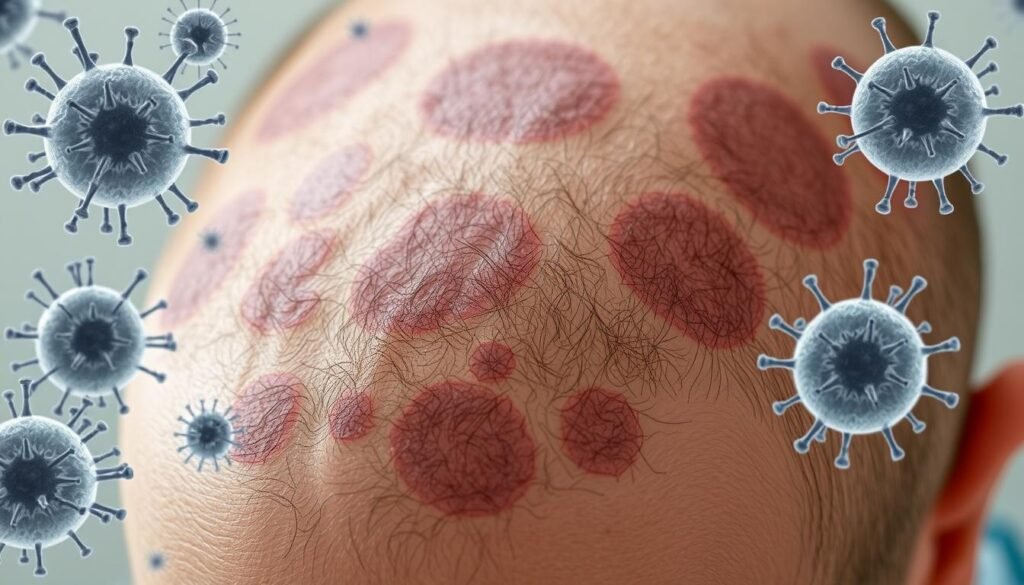Did you know about 80 million Americans are dealing with hair loss? Often, it’s a clue to more serious health issues. It can point to autoimmune diseases, issues with the thyroid, or not getting enough nutrients. It’s vital to know these connections to stay healthy.
Hair loss might happen for many reasons, like hormone changes or stress. It’s important for people to notice these signs early. Then, they should talk to a doctor. This article will help you understand how health affects your hair. You’ll learn how to make good choices for your hair and health.
We will explore the link between hair loss and health worries. This will give you the knowledge to tackle problems early. Staying informed is key to managing health better.
Key Takeaways
- Hair loss may signal underlying health issues, not just a cosmetic concern.
- Conditions such as autoimmune diseases are closely associated with hair loss.
- Thyroid disorders can significantly affect hair growth.
- Nutritional deficiencies can lead to noticeable hair loss.
- Stress-induced hair loss is a common yet often overlooked issue.
- Recognizing symptoms early can lead to effective treatment and better health outcomes.
Understanding Hair Loss: An Overview
Hair loss is a common problem that distresses many. A deep look into hair loss overview shows different reasons for it. Knowing the types of hair loss helps people figure out their situation and get needed help.
Hair loss falls into two main groups: permanent and temporary. Conditions like androgenetic alopecia, also known as male or female pattern baldness, cause permanent hair loss. Temporary hair loss might come from illness, changes in hormones, or environmental issues.
Many factors lead to hair loss. Genes play a big part, with people inheriting hair loss traits from family. As we get older, our hair may grow slower and thin out. Things around us like diet, pollution, and stress also play a role.
Hormonal imbalance is another key factor. It’s important to understand how health issues link to these causes of hair loss.
The Connection Between Health Conditions and Hair Loss
Understanding the link between health and hair loss is vital. Many illnesses show themselves not just through symptoms but in hair growth changes too. Conditions like hormonal imbalances, autoimmune diseases, and lack of vitamins are common culprits.
Thyroid issues can make hair loss worse, resulting in thinning hair or bald spots. Hormone changes, especially during menopause or pregnancy, affect hair health. Managing these can help improve hair growth and health.
Stress, too, can make hair loss related to health conditions worse. Addressing such factors is key in fighting hair loss. This encourages a well-rounded approach to health. By understanding these links, people can take steps to improve hair growth. For more on this, here’s a useful link.
Knowing how medical conditions affect hair health helps in creating better management plans. If you’re losing hair without a clear reason, get medical advice. Being informed allows you to regain confidence and enjoy healthier hair.
Alopecia Areata: An Autoimmune Response
Alopecia areata causes hair loss by making the immune system attack hair follicles. This leads to patches of hair loss, making it different from other hair loss types. It is important to know about this condition to help affected people.
What Is Alopecia Areata?
This condition happens when the immune system attacks hair follicles, causing hair to fall out suddenly. It might start with small patches. Then, it can cause total hair loss on the scalp or all over the body. This makes it different from other hair loss causes that happen gradually.
Symptoms and Diagnosis
The symptoms of alopecia can vary but often include:
- Hair loss in small, round patches on the scalp and other body areas
- Changes in the texture or color of the nails
- Possible tingling or itching sensation in the affected areas
Diagnosis involves a physical examination by healthcare providers. They look at the hair loss pattern. Sometimes, a biopsy is needed to make sure it’s alopecia and not something else.
Treatment Options for Alopecia Areata
Several treatments can help:
- Topical immunotherapy: Chemicals are put on the scalp to make the immune system react and grow hair.
- Steroid injections: Steroids directly injected into the areas can help reduce inflammation and aid in hair growth.
- Lifestyle modifications: Managing stress and eating well can help with hair health, helping some people.
It’s crucial to understand alopecia treatments. The best approach depends on how the person responds and the condition’s progress.

| Treatment Option | Description | Effectiveness |
|---|---|---|
| Topical Immunotherapy | Stimulates hair regrowth through immune response. | Moderate to High |
| Steroid Injections | Reduces inflammation in hair follicles. | Variable |
| Lifestyle Modifications | Includes stress management and dietary changes. | Complementary |
Thyroid Disorders and Hair Loss
Thyroid disorders impact hair growth, leading to hair loss. It is key to understand how thyroid issues affect hair. These glands generate hormones controlling various body functions. This includes metabolism, energy, and hair follicle health. Imbalance due to hypothyroidism or hyperthyroidism can cause hair to thin and fall.
How Thyroid Dysfunction Affects Hair Growth
Thyroid function is crucial for hair growth. Imbalanced hormones may cause the hair to enter a resting phase. This leads to hair falling out, especially in people with thyroid disorders. Balancing these hormones can help in gaining back healthier hair.
Common Thyroid Disorders Linked to Hair Loss
There are key thyroid disorders linked to hair loss:
- Hashimoto’s thyroiditis: This autoimmune issue causes hypothyroidism. It leads to dry and thinning hair, and noticeable loss.
- Graves’ disease: It results in hyperthyroidism, causing rapid hair thinning due to high hormone levels.
Understanding these disorders is crucial. It shows how thyroid problems lead to hair loss. Therefore, it’s vital to get medical advice promptly.
Managing Hair Loss Due to Thyroid Issues
Addressing thyroid-related hair loss involves a multifaceted strategy. Seeing healthcare professionals regularly helps in adjusting treatment. This stabilizes thyroid levels. Life changes, like reducing stress and eating well, are beneficial. Avoid supplements that may affect thyroid health. For more help, check out resources on managing thyroid hair loss.
Nutritional Deficiencies Impacting Hair Health
Nutritional deficiencies can lead to hair issues such as loss and slow growth. Having enough key nutrients is crucial for keeping hair healthy and full. It’s important to know which nutrients support hair growth and health.
Essential Nutrients for Hair Growth
Healthy hair growth relies on nutrients like iron, vitamin D, biotin, and folic acid. Iron helps get oxygen to your hair roots, giving life to your hair. Vitamin D is important for the life cycle of hair follicles. Biotin boosts keratin, which makes up hair. Folic acid helps in renewing cells that grow hair.
Identifying Nutritional Deficiencies
To spot nutritional issues, look at your diet and how you live. If your hair is thinning or falling out more, you might be missing key nutrients. Blood tests can show what you’re lacking. Checking your diet helps see if you’re getting what your hair needs. For more details, you can check out this resource.
Supplements and Diet Adjustments
Adding supplements can improve hair health for those missing out on nutrients. Look for multivitamins or specific supplements with biotin, vitamin D, and iron. Changing what you eat is also key. Eating fruits, veggies, lean meats, and whole grains boosts your overall health, which includes your hair.

| Essential Nutrient | Benefits for Hair | Food Sources |
|---|---|---|
| Iron | Promotes oxygen supply to hair follicles | Red meat, spinach, lentils |
| Vitamin D | Supports hair follicle cycling | Fatty fish, egg yolks, fortified foods |
| Biotin | Enhances keratin production | Eggs, nuts, seeds |
| Folic Acid | Regenerates hair cells | Leafy greens, beans, citrus fruits |
Hormonal Imbalances and Their Effects on Hair
Hormonal imbalances have a big impact on hair health. They cause various types of hormone-related hair loss. Changes in hormone levels can mean more hair shedding or thinning at times like pregnancy or menopause. Androgens and estrogens play a key part in hair growth. Often, changes in these hormones lead to hair loss.
For those facing hair loss, it’s important to understand how hormone changes affect them. Conditions like Polycystic Ovary Syndrome (PCOS) increase androgen levels, causing thinning. Lower estrogen levels during menopause can make shedding worse. Keeping an eye on hormone levels helps manage these issues.
To keep your hair health good, some lifestyle changes can help balance hormones. Eating well, getting enough vitamin D and iron, and getting advice from experts can help. To learn more about how hormones and hair connect, check out this article.

| Hormonal Change | Effects on Hair |
|---|---|
| Increased Androgens | Higher risk of hair thinning |
| Decreased Estrogens | Increased hair shedding |
| Pregnancy Hormones | Temporary hair fullness |
| Menopausal Hormonal Shift | Long-term thinning |
Stress-Induced Hair Loss: The Hidden Link
Stress-triggered hair loss is often ignored. It’s a link between how we feel and our hair’s condition. Learning about stress’s effect on hair growth is key for people with unexplained hair loss. We will explore what stress does to hair roots, how to handle stress, and spotting early hair loss signs.
The Impact of Stress on the Hair Growth Cycle
Stress messes with the hair cycle, forcing hair into a rest stage. This means the body might lose more hair than normal. Hair growth needs many factors to work right. But too much stress can upset this balance. This leads to losing hair because of stress.
Managing Stress for Better Hair Health
Controlling stress helps keep hair healthy. Activities like exercise, meditation, and getting enough sleep can lower stress. Having fun and being with friends can make us stronger emotionally. This might even make our hair healthier.
Recognizing Signs of Stress-Induced Hair Loss
Spotting early signs of hair loss is smart. Signs include more hair falling out when you wash it, thin spots, and changes in how your hair feels. Knowing these signs helps you react fast. This can help stop more hair loss.
Scalp Infections: A Potential Cause of Hair Loss
Scalp infections are a key but often ignored cause of hair loss. Many infections can hit the scalp, each affecting hair health differently. Especially, fungal infections like ringworm can harm hair growth and the hair follicles. Bacterial infections might lead to inflammation, causing hair to fall out and damaging the follicles.
Fungal infections often show as itchy, scaly spots on the scalp. These can lead to hair loss if not treated early. Using antifungal medicines and keeping the scalp clean are important to fight these infections. Washing your hair regularly with a good antifungal shampoo helps lower infection risks and keeps the scalp healthy.
If scalp infections aren’t treated quickly, they can cause lasting hair loss. This can be very upsetting. Learning how to spot scalp infections early is key to managing and treating them effectively.
| Type of Infection | Common Symptoms | Treatment Options | Potential Impact on Hair |
|---|---|---|---|
| Fungal Infections | Itchy, scaly patches | Antifungal medications, medicated shampoos | Can lead to hair loss if untreated |
| Bacterial Infections | Redness, swelling, pus | Antibiotics, antibacterial shampoos | May cause inflammation and hair loss |
Knowing how scalp infections link to hair loss shows why treating scalp problems fast is crucial. Proper care can save hair health and avoid serious issues later.
Telogen Effluvium: Shedding More Than Usual
Telogen effluvium is a common type of hair shedding. Many people go through it at some stage in their lives. It shows up as more hair falling out, especially when brushing or shampooing. Knowing the causes of telogen effluvium helps deal with the hair loss it brings.
Several things can cause telogen effluvium:
- Emotional stress
- Physical trauma
- Hormonal changes
- Severe illness or infection
- Nutritional deficiencies
This condition often kicks in months after a stressful situation. For instance, hair might start to fall out 3 to 6 months after a big stress. This makes it hard to link the shedding to its cause.
It’s important to spot telogen effluvium early, even though it’s temporary. You might see thin spots or less hair on your head. It’s key to talk to a doctor. They can diagnose it properly and suggest ways to take care of it.
Ways to recover include:
- Managing stress better
- Changing your diet to get more nutrients
- Taking vitamins and minerals supplements
- Using scalp treatments to help hair grow
Despite the worry telogen effluvium can cause, most times, hair goes back to normal. This happens after the cause is dealt with. Being aware of the causes of telogen effluvium lets people act fast to improve their hair’s health.
Health Conditions Linked to Hair Loss: A Comprehensive Overview
Understanding how hair loss connects to health conditions is key. It lets people take action to improve their hair health. Many health issues can cause hair loss in both men and women. These issues might show there’s a deeper problem needing attention.
Common Medical Conditions Associated with Hair Loss
Some health problems can cause you to lose hair. These include:
- Alopecia Areata: This disease causes sudden, patchy hair loss.
- Thyroid Disorders: When your thyroid gland doesn’t work right, it can mess up hair growth.
- Iron Deficiency Anemia: Not having enough iron can make your hair thin. This is because your hair roots get less oxygen.
- Polycystic Ovary Syndrome (PCOS): This condition messes with hormones and can lead to thin hair, especially in women.
- Dermatitis: Certain skin problems, like seborrheic dermatitis, can also lead to hair loss.
Seeking Help: When to Consult a Doctor
If you’re losing hair and can’t figure out why, it’s smart to see a doctor. Finding out early what’s causing your hair loss can help you handle it better. You should definitely talk to a doctor if you notice:
- Sudden or patchy hair loss.
- Other issues like feeling very tired or weight changes.
- If hair loss runs in your family.
Conclusion
Understanding the reasons behind hair loss is vital for those dealing with it. This article reviewed many health issues that lead to losing hair. Issues range from autoimmune diseases like alopecia areata, to problems with the thyroid and not getting enough nutrients. Each problem affects hair health differently. It’s key to spot signs early on.
Hair loss impacts more than just looks. It can hurt mental health and how we see ourselves. So, it’s key for those losing hair to get medical advice. They should also tackle any health problems they have. Acting early can help keep hair healthy.
There is hope for those trying to improve their hair health. Being well-informed about why hair loss happens and how to deal with it is the first step. If you’re worried about losing hair, talk to a doctor. They can help find the right way to handle it.